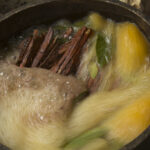BBC Earth
Image: mccun934
A good 840 years before the Sex Pistols sang about anarchy in the UK, one chunk of the country faced the real thing. A crisis in the royal succession led to almost 20 years of civil war and rebellion in both England and Normandy, which was then controlled by the English crown. But this time the trigger was not disenfranchised youth, but a dish of fish.
Rather than dying in battle, or peacefully from natural causes, King Henry I reportedly died by gorging on lampreys: apparently against medical advice. After his death, people fought for the throne.
The story is almost certainly apocryphal, says historian Giles Gasper of Durham University in the UK. The only account of Henry’s death that mentions lampreys was written by a 12th-century historian who was no fan of the dead king. Nevertheless, many schoolchildren down the years have learned of the dangers posed by a surfeit of lampreys.
King Henry’s experience evidently did not deter future monarchs. Many of his successors were fans of lampreys, and the fish has been regarded as a regal food for thousands of years. This might amaze many today, given that the alarming-looking lamprey has fallen off the menu in many parts of the world.
What might also come as a surprise is the high regard in which scientists hold lampreys. Ecologists know that lampreys maintain the health of rivers. Medical researchers study lampreys, which have a remarkable ability to heal themselves even after severe nerve damage: an ability that could offer a way to heal spinal cord injuries. Read more on the BBC Earth website…








